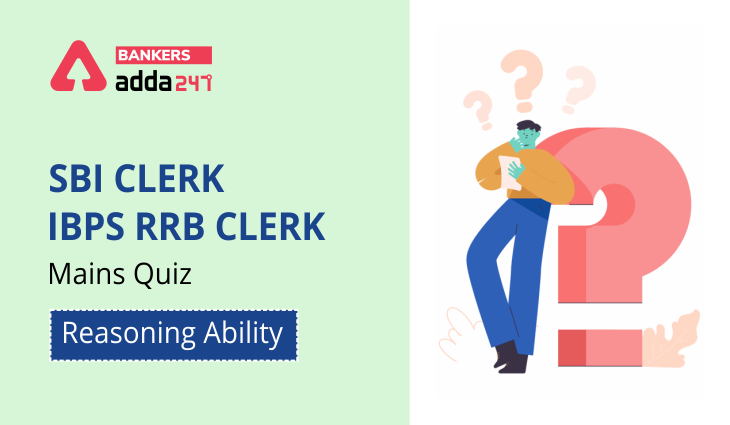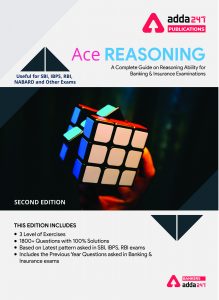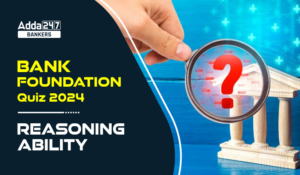Directions (1-5): Read the given information carefully and answer the given questions.
There are seven friends i.e. J, K, L, M, N, O and P, each having different salaries. They all belong to different cities i.e. A, B, C, D, E, F, and G (but not necessarily in same order) also they like different colours i.e. Red, Green, Blue, Violet, Pink, white, and Black (but not necessarily in same order).
K likes green colour. P is from G but K is not from A. M’s salary is more than only 2 people and he is from D. The one who belongs to B, earn more than N but less than O. The one who likes the red colour earn more money than the person who is from D. N is from E and likes Violet colour. O belongs neither from A nor from F but likes the white colour. The one who likes the pink colour earns the highest salary. The one who likes the violet colour is not the lowest earner among them. The one who likes green colour does not belongs to B. L earns less money than N. L earns less than the person who likes the blue colour. The one who belongs to F earns more than the one who belong to C.
Q1. Who among the following is from D?
(a) The one who gets lowest salary
(b) M
(c) The one who likes pink
(d) K
(e) None of these
L1Difficulty 2
QTags Puzzle
Q2. Who among the following like violet colour?
(a) L
(b) M
(c) N
(d) O
(e) None of these
L1Difficulty 2
QTags Puzzle
Q3. Who among the following gets highest salary?
(a) O
(b) P
(c) J
(d) N
(e) None of these
L1Difficulty 2
QTags Puzzle
Q4. M likes which of the following colour?
(a) Red
(b) Black
(c) Blue
(d) Pink
(e) None of these
L1Difficulty 2
QTags Puzzle
Q5. Who among the following belongs to F?
(a) O
(b) K
(c) J
(d) N
(e) None of these
L1Difficulty 2
QTags Puzzle
Directions (6-9): Study the information carefully and answer the questions given below.
In a certain code:
“January February march ” is coded as – “OR SR EC”
“April may June” is coded as – “KI LA EN”
“July august September ” is coded as – “OL SS AE”
“October November December ” is coded as – “CE DE NE”
Q6. What may be the code for “incharge”?
(a) CG
(b) BD
(c) DG
(d) either (a) or (b)
(e) HJ
Q7. What will be the code for “dictionary”?
(a) NU
(b) RG
(c) UR
(d) VB
(e) FO
Q8. What may be the code for “reference review”?
(a) TE UI
(b) YT KS
(c) BN CV
(d) MC EE
(e) None of these
Q9. “CO” may be the code for?
(a) bank
(b) question
(c) section
(d) layouts
(e) None of these
Q10. What should be placed in place of question mark(?) in equation B ≤ A ? N ? K ? S to make A > S always follow.
(a) =, >, ≥
(b) =, <, ≥
(c) =, >,<
(d) =, >, ≤
(e) None of these
Directions (11-12): In the following questions, the symbols &, *, $, % and © are used with the following meanings as illustrated below. Study the following information and answer the given questions:
P&Q – P is the parent of Q.
P%Q- P is the grandchild of Q.
P©Q- Q is the only daughter of P.
P*Q- Q is the father of P.
P$Q – P is the husband of Q.
Q11. If U©V*W&X%Y$Z then how V is related to Z?
(a)Grandfather
(b)Uncle
(c)Grand-daughter
(d)Wife
(e)None of these
Q12. If K&L%M©N*O then how K is related to N?
(a)father
(b)Brother
(c)daughter
(d)Sister
(e)None of these
Q13. What should come in place of question mark (?) in the following series based on the above arrangement?
PA NB KD GG ?
(a) CB
(b) BK
(c) AB
(d) CA
(e) Other than the given options
Q14. Statement: World Health Organisation has decided to double its assistance to various health programmes in India as per-capital expenditure on health in India is very low compared to may other countries.
Assumptions:
I. The enhanced assistance may substantially increase the per-capita expenditure on health in India and bring it on par with other countries.
II. The Government funding is less than adequate to provide medical facilities in India.
(a) Only I is implicit
(b) Only II is implicit
(c) Either I or II is implicit
(d) Neither I nor II is implicit
(e) Both I and II are implicit
Q15. Statement: “A visit of school children to forest to widen their knowledge of natural resources has been arranged.” – A notice in the school.
Assumptions:
I. Forests are full of natural resources.
II. Children are likely to learn from their interaction with the new environment.
(a) Only I is implicit
(b) Only II is implicit
(c) Either I or II is implicit
(d) Neither I nor II is implicit
(e) Both I and II are implicit
Solutions


Click Here to Register for Bank Exams 2021 Preparation Material




 General Awareness Quiz for Bank Mains Ex...
General Awareness Quiz for Bank Mains Ex...
 English Language Quiz For Bank Foundatio...
English Language Quiz For Bank Foundatio...
 Reasoning Quiz For Bank Foundation 2024 ...
Reasoning Quiz For Bank Foundation 2024 ...





